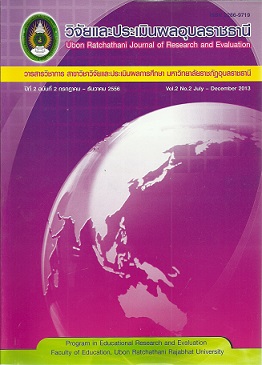Development of Analytical Thinking Skills in History subject by using the Cooperative Learning Process for Mattayomsuksa Two Students of Ban Nongtao School under Ubon Ratchathani Primary Educational Service Area Office 2
Keywords:
ทักษะการคิดวิเคราะห์ การจัดการเรียนรู้โดยใช้กระบวนการเรียนรู้แบบร่วมมือAbstract
The research aimed to develop analytical thinking skills by using the cooperative learning process and to study the results of that development in the history subject for Mattayomsuksa two (grade 8) students of Ban Nongtao School.
The target group was 34 grade 8 students of Ban Nongtao School in Trakanphuetphon district in the second semester of the school year 2012. The research instruments consisted of
1) seven lesson plans based on the cooperative learning process and 2) the test for analytic thinking skills, quizzes, learning achievement test, observation recording form, and interview form for learners, and daily records. Statistics used in data analysis were percentage, mean and standard deviation.
The research findings were as follows.
- The development of analytical thinking skills comprised three circles. Each circles consisted of three stages: planning, operation and observation and feedback. In circle one, there were two plans; in circle two, there were three plans and in circle three, there were two plans. Learning was conducted by using a cooperative learning process composed of five stages: preparation: students were divided into sub-groups and were informed of rules, roles and duties. Teaching: a teacher introduced a lesson, content and sources and explained the working steps. Group activities: students learn in a group and were engaged in different activities as assigned. Performance examination and test: it was concerned with the students’ duties as assigned. Summary and performance evaluation: both students and teachers worked together to summarized a lesson and evaluate a group performance. If students secured the scores lower than 75% of the total, it was important to give a remedial lesson. The result showed that with learning activities based on a cooperative learning process in operation, the students possessed desirable characteristics and better analytical thinking skills.
- The students under study had higher analytical thinking skills than before. Their average scores before learning averaged 6.65 accounting for 44.31%. Their average scores after learning averaged 13.15 accounting for 87.65%. The results of analytical thinking skills showed that the skills of the students under study before and after learning progressed by 43.34%. It means that the students had passed the set criterion of 75%.
References
จริณ แก้วสนิท. นวัตกรรมการศึกษาชุดการเขียนแผนการจัดการเรียนรู้สู่การปฏิบัติ. กรุงเทพฯ : ธารอักษร, 2548.
จิดา ชาติโสม. ผลการจัดกิจกรรมการเรียนรู้แบบร่วมมือ เทคนิคร่วมกันคิด TAI กลุ่มสาระการเรียนรู้สังคมศึกษา ศาสนาและวัฒนธรรม ชั้นประถมศึกษาปีที่ 6. วิทยานิพนธ์การศึกษามหาบัณฑิต มหาวิทยาลัย
มหาสารคาม, 2553.
นิภาจิตร บัวรอด. ผลการจัดกิจกรรมการเรียนรู้แบบร่วมมือ เรื่อง ความเป็นมาของชาติไทยชั้นมัธยมศึกษา
ปีที่ 3 กลุ่มสาระการเรียนรู้สังคมศึกษา ศาสนาและวัฒนธรรม. วิทยานิพนธ์การศึกษามหาบัณฑิต มหาวิทยาลัยมหาสารคาม, 2551.
เบญจพรรณ ดิษฐเนตร. การพัฒนากิจกรรมการเรียนรู้โดยการเรียนรู้แบบร่วมมือ เรื่อง กฎหมายที่เกี่ยวข้องกับชีวิตประจำวัน กลุ่มสาระการเรียนรู้สังคมศึกษา ศาสนา และวัฒนธรรม ชั้นมัธยมศึกษาปีที่ 4. การศึกษาค้นคว้าอิสระการศึกษามหาบัณฑิต มหาวิทยาลัยมหาสารคาม, 2547.
ปฐมพงษ์ บานฤทัย. การจัดการเรียนรู้แบบร่วมมือ (Jigsaw) เรื่อง การเมืองการปกครองสมัย อยุธยา กลุ่มสาระสังคมศึกษา ศาสนา และวัฒนธรรม ชั้นมัธยมศึกษาปีที่ 2. วิทยานิพนธ์การศึกษามหาบัณฑิต มหาวิทยาลัยมหาสารคาม, 2550.
พิมพันธ์ เดชะคุปต์. การเรียนการสอนที่เน้นผู้เรียนเป็นสำคัญ : เทคนิควิธีและเทคนิคการสอน. กรุงเทพฯ : เดอะมาสเตอร์กรุ๊ปแมเนจแมนท์, 2543.
รับรองมาตรฐานและประเมินคุณภาพการศึกษา (องค์การมหาชน), สำนักงาน. รายงานการประเมินคุณภาพภายนอกสถานศึกษาระดับการศึกษาขั้นพื้นฐานรอบสอง (พ.ศ.2549-2553). กรุงเทพฯ : สำนักงานรับรองมาตรฐานและประเมินคุณภาพการศึกษา (องค์การมหาชน), 2553.
รำไพ น้ำคำ. ผลการจัดกิจกรรมการเรียนรู้เรื่อง หลักธรรมทางพระพุทธศาสนา โดยใช้การจัดกิจกรรมการเรียนรู้แบบร่วมมือ เทคนิคจิ๊กซอว์ กลุ่มสาระการเรียนรู้สังคมศึกษา ศาสนาและวัฒนธรรม ชั้นมัธยมศึกษาปีที่ 1. วิทยานิพนธ์การศึกษามหาบัณฑิต มหาวิทยาลัยมหาสาคาม, 2553.
เลขาธิการสภาการศึกษา, สำนักงาน. ข้อเสนอการปฏิรูปการศึกษาในทศวรรษที่สอง (พ.ศ. 2552-2561). กรุงเทพฯ : พริกหวานกราฟิค, 2553.
ศึกษาธิการ, กระทรวง. คู่มือการจัดกิจกรรมการเรียนการสอนประวัติศาสตร์ ประวัติศาสตร์ไทย : จะเรียน
จะสอนอย่างไร. กรุงเทพฯ : โรงพิมพ์การศึกษา กรมการศาสนา, 2543.
. พระราชบัญญัติการศึกษาแห่งชาติ พ.ศ. 2542 และที่แก้ไขเพิ่มเติม (ฉบับที่ 2) พ.ศ. 2545. กรุงเทพฯ : พริกหวานกราฟฟิค, 2545.
. หลักสูตรแกนกลางการศึกษาขั้นพื้นฐาน พุทธศักราช 2551. พิมพ์ครั้งที่ 3. กรุงเทพฯ : โรงพิมพ์ชุมนุมสหกรณ์การเกษตรแห่งประเทศไทย, 2553.
เศวตกนิษฐ์ ศรีสนาย. การพัฒนาแผนการจัดการเรียนรู้แบบร่วมมือ โดยใช้เทคนิค Jigsaw สาระประวัติศาสตร์ ชั้นมัธยมศึกษาปีที่ 3. วิทยานิพนธ์การศึกษามหาบัณฑิต มหาวิทยาลัยมหาสารคาม, 2552.
Beck-Jones, Juanda Joan. “The Effect of Cross-training and Role Assignment in Cooperative Learning Groups on Task Performance, Knowledge of Accounting Concepts, Teamwork Behavior, Acquisition of Interposition Knowledge,” Dissertations Abstracts International. 64, 07 (January 2004) : 2378-A.
Lampe, Judith R. Rooze, Gane E. and Mary Tallent Runnels. “Effect of Cooperative Learning Among Hispanic Student in Elementary Social Studies,” The Journal of Education Research. 89 (January / February 1996) : 187-191.
Downloads
Published
How to Cite
Issue
Section
License
1. บทความที่ตีพิมพ์ในวารสารนี้ได้มีการตรวจสอบการลอกเลียนงานวรรณกรรมแล้ว ไม่เกินร้อยละ 25
2. บทความที่ตีพิมพ์ในวารสารนี้เป็นข้อคิดเห็น ข้อค้นพบของผู้เขียนบทความ โดยผู้เขียนบทความต้องเป็นผู้รับผิดชอบต่อผลทางกฎหมายใด ๆ ที่อาจเกิดขึ้นจากบทความนั้น ๆ
3. บทความ ข้อมูล เนื้อหา รูปภาพ ฯลฯ ที่ได้รับการตีพิมพ์ในวารสารวิจัยและประเมินผลอุบลราชธานี ถือเป็นลิขสิทธิ์ของวารสารวิจัยและประเมินผลอุบลราชธานี หากบุคคลหรือหน่วยงานใดต้องการนำทั้งหมดไปเผยแพร่ต่อหรือเพื่อกระทำการใดๆ จะต้องได้รับอนุญาตเป็นลายลักษณ์อักษรจากวารสารวิจัยและประเมินผลอุบลราชธานีก่อนเท่านั้น และจะต้องมีการอ้างอิงวารสารวิจัยและประเมินผลอุบลราชธานี ฉบับนั้น ๆ ด้วย






